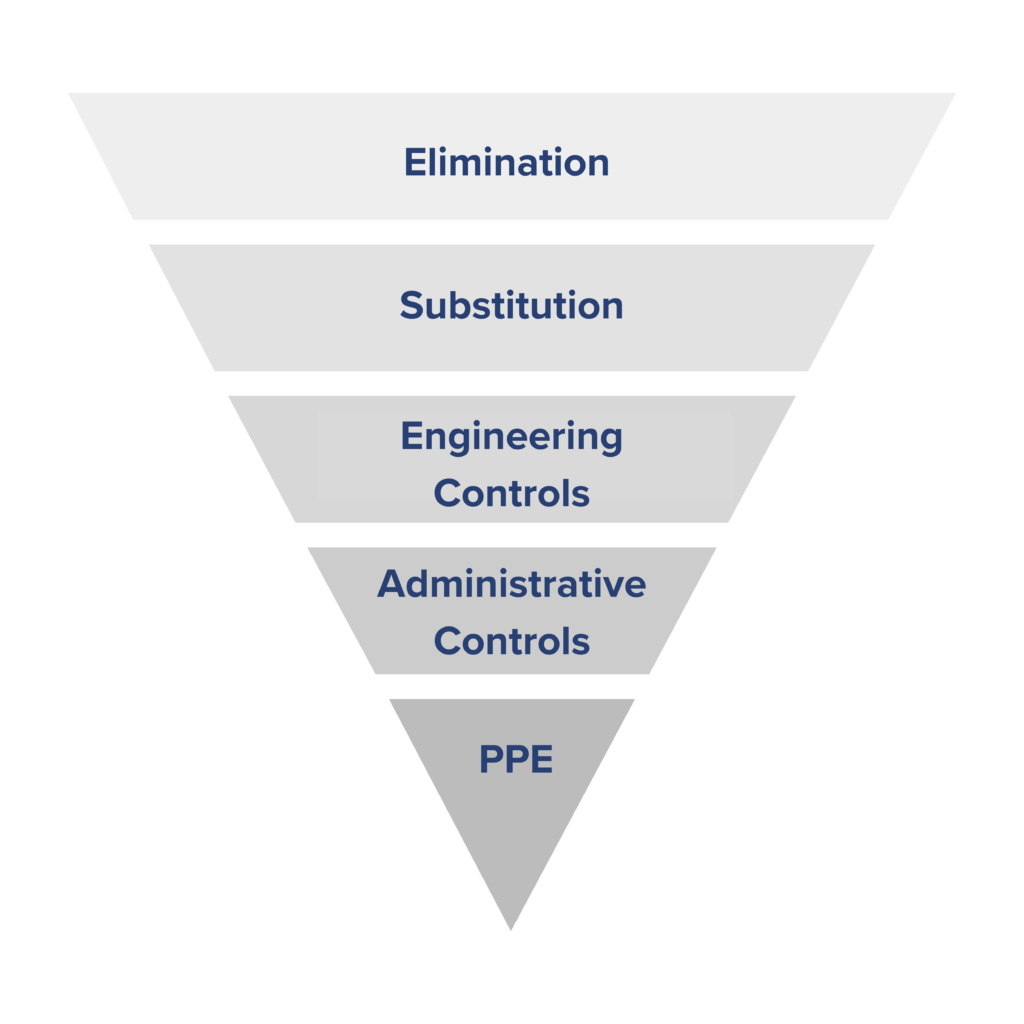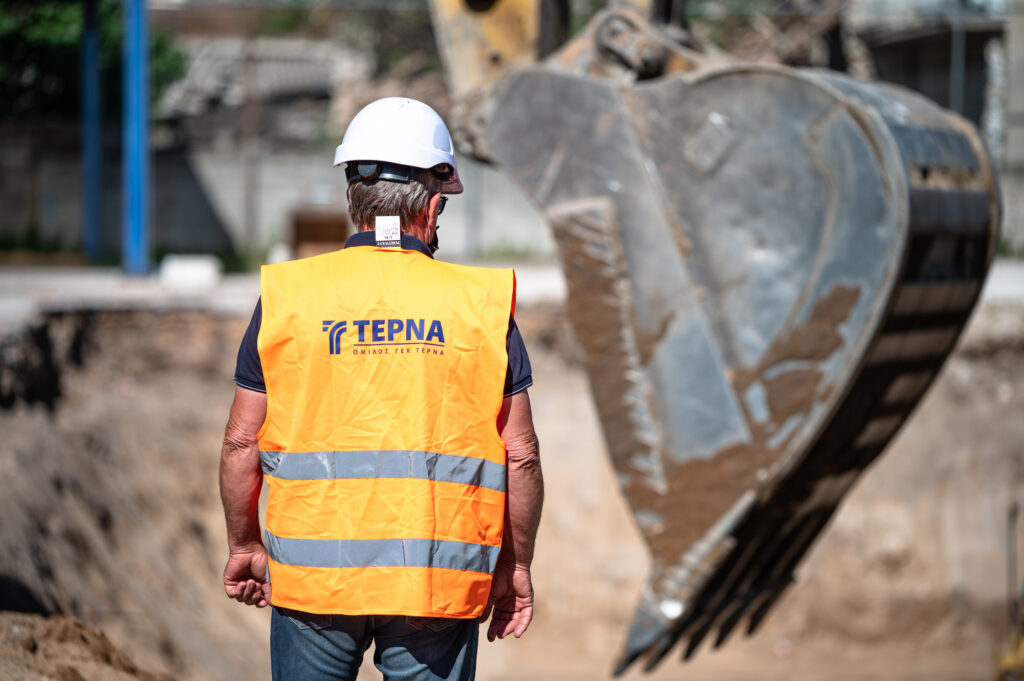The Group recognises that employees are the driving force behind its growth. It understands the importance of a safe and healthy working environment, offering a place that not only promotes professional development but also equality, eliminating discrimination.
GEK TERNA Group invests daily in its people and ensures a working environment that takes care of:

Safeguarding the health and safety of employees, partners, and visitors at the Group’s facilities and worksites is a strategic priority and an integral part of its responsible business operations. The Group recognizes occupational health and safety as a fundamental human right and is committed to the continuous improvement of working conditions.
Health and Safety Management System
In this context, the Group implements a comprehensive Health and Safety Management System, certified according to international standards ISO 45001 and ISO 39001, and fully compliant with all applicable legal, national, European, and international requirements. The system applies to all Group employees and subcontractors and is implemented across every sector of the Group’s operations.
Key elements of the Health & Safety System include:
• Full compliance with the applicable legal and regulatory framework, as well as internationally recognized health and safety standards, as a fundamental prerequisite for sustainable and responsible operations.
• Systematic monitoring and continuous improvement of policies, procedures, and performance indicators related to Health and Safety, with the aim of accident prevention and elimination.
• Investment in cutting-edge technologies and best practices that enhance predictive capabilities and operational readiness in critical situations.
• Ensuring adequate staffing with specialized personnel (Safety Technicians, Occupational Physicians) at each site, in accordance with legal requirements and the specific needs of each project.
• Establishment and regular activation of emergency response plans through organized scenarios and preparedness drills, aimed at strengthening resilience and rapid response.
• Strict implementation of the “No work unless safe” policy – No task is permitted to begin without ensuring appropriate equipment, proper training, and sufficient personnel.
• Ongoing training of personnel on safety, prevention, and first aid, to strengthen risk prevention and management capabilities.
• Fostering a unified corporate Health & Safety culture, with clear goal-setting, employee empowerment, and integration of related values at all levels of management and operations.
• Continuous inspection and technical adequacy of facilities and equipment, to prevent wear, failures, and operational deviations.
• Regular audits and reviews as part of the corporate governance mechanism and risk management strategy.
Minimising risks
In order to prevent and minimise risks in a timely manner, the Group applies a systematic approach which aims to classify the risks that can be controlled by following the following hierarchy:

• In order to identify work-related risks and assess them on a regular and non-regular basis, the Group:
• Recognises and applies all legal and other relevant health and safety requirements.
• It works with Safety Technicians to conduct studies and implement preventative measures.
• It works with Occupational Physicians who systematically monitor the health of employees.
• Conducts internal inspections to ensure compliance with the health and safety management system.
• Design and implement preparedness plans and exercises.
• Monitor and record all relevant physical, chemical and biological factors affecting the health and safety of workers.
• Provide appropriate personal protective equipment to each worker according to the type of work.

Ongoing training and the development of employee skills are a strategic priority for the Group, as they contribute to enhancing productivity, fostering innovation, and achieving strategic objectives, while also ensuring a competitive and modern working environment. To foster a culture of growth, the Group systematically invests in delivering appropriate training programmes aimed at strengthening employee capabilities and supporting them in meeting the organisation’s goals.
The Group’s Training Policy provides an overarching framework for all staff development initiatives, outlining internal procedures for human capital development and the transfer of knowledge and experience. The Human Capital Department is responsible for implementing this policy, which is tailored to the specific needs of each subsidiary.
The Group’s training plan includes the following initiatives:
• In-house training programmes
• Inter-company programmes delivered by external providers
• Participation in conferences, seminars, lectures, and exhibitions
• Professional qualification certifications
• Foreign language courses
• Subsidies for postgraduate studies
As part of its digital transformation, the Group has implemented a centralised digital Learning Management System (LMS – Knowledge Center) across all its companies, offering a unified, interactive, and modern learning environment. This platform provides all employees with a comprehensive training experience through the use of innovative e-learning technologies.
Each year, internal training sessions are delivered by supervisors and subject-matter experts on critical topics such as Health and Safety, Environmental Management, Data Protection, Cybersecurity, and the implementation of the Code of Conduct.

Promoting equal opportunities is a fundamental value of the Group and a key pillar of its corporate culture. The Group recognizes that creating a sustainable and fair world requires conditions that encourage and highlight diversity, promote inclusion, and safeguard the dignity of every individual, both in the workplace and in society at large.
In this context, the Group invests in shaping a work environment that respects and enhances diversity, equality, and inclusion, acknowledging that the diversity of people and ideas is a driving force for innovation, creativity, and organizational resilience.
The Group’s Code of Conduct ensures equal treatment for all employees, regardless of age, gender, religion, nationality, beliefs, or sexual orientation, and promotes gender equality across all levels of employment.
More specifically, the Group’s strategies and objectives include:
• Balanced representation of all genders at every level of employment
• Working toward broader female representation across departments and leadership tiers
• Continuous tracking and monitoring of the distribution of women by geographic region, age, and job level
The Group’s policies that promote and protect human rights are:
Human Rights Policy
The policy is aligned with the United Nations Guiding Principles on Business and Human Rights and sets the framework and principles for respecting human rights in the workplace. Its goal is to ensure the rights of the Group’s employees, business partners, and the local communities in which it operates.
Key areas of focus include the elimination of discrimination— including all forms of harassment— the promotion of equal opportunities, and the strengthening of diversity and inclusion.
Environmental, Social, and Governance (ESG) Policy
The Group’s ESG Policy includes a dedicated pillar focused on the protection of human rights. Through this policy, the Group commits to protecting fundamental labor rights such as freedom of association, the elimination of forced and child labor, and equality in the workplace. All forms of forced or compulsory labor are explicitly prohibited, while awareness and training on these critical issues are promoted. The Policy sets clear objectives, including zero incidents of violations and universal employee training on related topics.
Combating Violence and Harassment at Work
GEK TERNA Group has adopted the Policy against Violence and Harassment at Work, which recognises and respects the right of every employee to a working environment free from such practices. This policy aims to create and consolidate a working environment that respects, promotes and guarantees human dignity and the right of every individual to a safe working environment free from violence and harassment. By implementing the above policy, the Group declares its zero tolerance to any incident of violence and harassment, taking all appropriate and necessary measures.

The Group’s employment strategy and the implementation of best professional practices are central to its philosophy and highlight the importance of its contribution to local communities.
Employment at GEK TERNA Group
The Group’s primary concern is the promotion of equality and the elimination of any form of discrimination in the workplace. A commitment to providing an equal opportunities working environment, with open channels for professional development that ensures that every employee is treated with respect and fairness.
The Group, supports the filling of vacancies initially internally, through the Group’s employees, giving them the opportunity to develop professionally.
It is worth noting that the Group’s remuneration and benefits policy is designed with transparency, objectivity and takes into account the industry benchmark. Remuneration is determined by a combination of factors such as the importance and requirements of each position, the experience and skill level of the employee. Benefits are also adjusted based on the needs of the positions, ensuring a competitive and fair environment for all.
The Group manages human resources issues impartially and ensures that each employee is treated fairly and without discrimination to promote a fair working environment, a healthy corporate culture and the development of beneficial working relationships.
The implementation of the Group’s Recruitment Policy ensures that recruitment decisions are free from bias and discrimination based on gender, nationality, language, religion, political beliefs, disability or sexual orientation. The Human Resources Department ensures that the policy is implemented, ensuring a timely and impartial response to such incidents.
Attracting, retaining and motivating employees is a foundation for the successful operation of the Group. The Group’s recruitment and staffing policy is based on meritocratic and objective criteria and is not related to bias and discrimination based on gender, nationality, sexual orientation, religion, disability, age, or other discriminatory factors. The Human Resources Department is responsible for implementing the policy, but prioritizing the recognition of the needs of existing employees and the creation of a positive work environment that attracts and retains talent.
Increasing employment and creating opportunities locally are key elements of the Group’s strategy, as new jobs are primarily filled by staff from local communities, enhancing the growth and prosperity of the region.
Strengthening youth employment
The Group, supports initiatives related to the employment of young scientists and ensures the implementation of related actions. It creates policies and special programs related to the employment of young workers, their vocational training and careers. The Group collaborates with the largest University Institutions in the country (at times with the National Technical University of Athens, the National and Kapodistrian University of Athens, the Athens University of Economics and Business, the University of Piraeus, the Aristotle University of Thessaloniki, the University of Macedonia, etc.), strengthening the institution of Internship and the entry into the labour market. The Group creates appropriate opportunities that allow young people to acquire practical skills and experience in the workplace.
The Group views every young scientist as a potential valuable partner. In this context, it has developed a comprehensive internship program.
The key modules of the Internship Training time include:
• Work (full-time)
• Predefined job duties (full-time (full-time))
• Access to the Group’s library and tools
• Theoretical training through specialized training sessions at the “GEK TERNA_Knowledge_Center”
• Visits to projects
• Participation in meetings
• Meetings with heads of various departments
Through this structured approach, the Group offers young individuals meaningful opportunities to acquire practical skills, understand the work environment, and strengthen their professional confidence.

GEK TERNA Group continuously adapts its supply chain management processes to address emerging challenges and ensure sustainable growth with responsibility and consistency. By investing in long-term relationships of trust with its suppliers and partners, the Group promotes a collaboration model grounded in accountability, transparency, and mutual development.
A key objective is the selection of suppliers based on criteria that incorporate social, environmental, and economic factors, thereby supporting the transition to a sustainable supply chain. At the core of the Group’s efforts to maintain a sustainable supply chain are:
• Respect for human rights
• Environmental protection
• Ensuring health and safety in the workplace
The Group enforces a strict framework of meritocracy and zero tolerance for corruption, promoting fair remuneration, adherence to lawful working conditions, the elimination of discriminatory practices and exploitative labor, and the protection of freedom of association. These principles extend across the entire value chain, with compliance expected from all partners.
The Group recognizes that promoting the core principles and values of its corporate culture and business ethics, reflected in the Code of Conduct, throughout the supply chain is a key element of responsible business conduct. In this context, the Group implements a Procurement Policy that reinforces these fundamental principles and establishes a clear and transparent framework for collaboration with all suppliers, partners, and subcontractors.
The Policy incorporates ESG (Environmental, Social, and Governance) criteria for the evaluation and selection of suppliers and partners, with the ultimate goal of contributing to the creation of a supply chain that respects the principles of sustainability and social responsibility.






